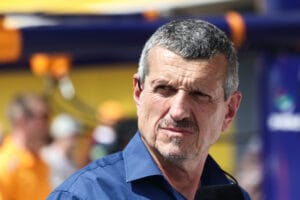After making a splash at the Olympics, LVMH is now shifting gears into the world of motorsports. The luxury conglomerate has inked an unprecedented ten-year contract with Formula 1, activating three of its brands: Tag Heuer, Moët & Chandon, and Louis Vuitton.
LVMH’s involvement in the Olympics was a significant move, but its commitment to Formula 1 as a global partner for a decade is a first for the sport. While the French luxury group has not publicly released any official report on its commitment to Paris 2024, the optimization of its contract (it had paid 150 million euros at a time when the Games’ budget was far from finalized) was highly noted. One of its brands, Vuitton, even managed to infiltrate the sports field during the ceremonial events. This partnership, the first directly signed by the group, did not end there. The commitment to Formula 1, owned by Liberty Media, starting next season, firmly establishes the group’s intent to commercially bridge the worlds of sports and entertainment.
Why Formula 1?
“For F1, which is present all year round on a global circuit, we have seen worldwide enthusiasm and significant growth,” explains Frédéric Arnault, one of Bernard Arnault’s five children and CEO of the Watchmaking division, who is the spokesperson on this matter. “Signing for ten years allows us to build things well and make a mark in terms of image. Strategic choices have also been made over the past ten years by the new shareholders. They have developed the United States, the world’s largest market with a strong historical automotive culture, and we sense significant growth potential. They also want to expand in Asia. They have rejuvenated and feminized the image. And numerous technical innovations and products could also be developed in partnership with our various businesses. The field is vast.”
Liberty Media’s Vision
Liberty Media aims to break the mold and “glamorize”…
Three Brands Selected for Partnership: Tag Heuer, Moët & Chandon, and Louis Vuitton
Three brands have been selected: Tag Heuer, Moët & Chandon, and Louis Vuitton. “They had the legitimacy to evolve in this universe,” continues Frédéric Arnault. “Bringing them together under the LVMH umbrella gives more strength and coherence to the partnership. It allows us to clearly define the territories and rules.” While the idea of integrating others during the decade is not on the agenda (other alcohols may nevertheless be activated outside of France), the chosen trio is far from insignificant.
Tag Heuer, which will replace Rolex as the official timekeeper, a position Rolex has held since 2013, is a regular on the circuits. A partner of F1 from 1992 to 2003, the watchmaker was already associated with Ferrari from 1971 to 1979 and McLaren from 1986 to 2016 before being associated with the Red Bull team and its two drivers, Max Verstappen and Sergio Perez, a contract that is also maintained. Moët & Chandon was on the podium of the first French GP in 1950, in Reims, won by Juan Manuel Fangio (F1 was linked to the wine and spirits company from the 1960s until 1997).
Louis Vuitton’s Enthusiasm for Sport
Finally, Louis Vuitton has been presenting the trophy to the winner of the Monaco GP since 2021. But what will be the concrete presence of the number one brand at LVMH, with its vertiginous growth, on the circuits? Some global partners give their name to a Grand Prix, becoming the title sponsor of the event (like the trunk maker with the America’s Cup in sailing). Will it then be attached to the prestigious Monaco or the now highly sought-after Miami? Will the brand dress the Formula 1 staff? Will it squat the famous checkered flag? All ideas that may not be so far-fetched when we remember the Olympics but also the desire of the American owners of Liberty to break the traditional codes of the sport, to renew the image of the discipline, and to “glamorize” it for an ever larger audience. The answer will come on March 16, 2025, for the first GP in Melbourne, and perhaps even during the pre-season private tests.
Before signing the contract, the environmental aspect was of course discussed. “They announce carbon neutrality by 2030 with a serious and credible plan” (the regulation on fuel changes from the 2026 season), continues Frédéric Arnault. “The market believes in it, the public believes in it, we believe in it.” And can the French public hope that with the signing of such a contract, a French GP will one day become a reality again? We won’t know more… For now.









